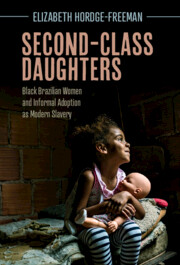Book contents
- Second-Class Daughters
- Afro-Latin America
- Second-Class Daughters
- Copyright page
- Dedication
- Contents
- Figure
- Acknowledgments
- Introduction
- 1 Adopting Modern Slavery
- 2 “Quase da Família” (Almost Family)
- 3 Prisoners of Love
- 4 Depths and Debts of Gratitude
- 5 Family Bonds and Bondage
- 6 Home Sick
- 7 Freedom to “Live Her Own Liberty”
- Conclusion
- Book part
- Works Cited
- Index
Conclusion
“The Last of Our Kind?”
Published online by Cambridge University Press: 10 March 2022
- Second-Class Daughters
- Afro-Latin America
- Second-Class Daughters
- Copyright page
- Dedication
- Contents
- Figure
- Acknowledgments
- Introduction
- 1 Adopting Modern Slavery
- 2 “Quase da Família” (Almost Family)
- 3 Prisoners of Love
- 4 Depths and Debts of Gratitude
- 5 Family Bonds and Bondage
- 6 Home Sick
- 7 Freedom to “Live Her Own Liberty”
- Conclusion
- Book part
- Works Cited
- Index
Summary
In the concluding chapter, the author reiterates how the hyper-exploitation of filhas de criação is sustained by an affective architecture of domination that interlocks morality and family to produce affective captivity. Zooming out from informal adoption, she highlights the role of consciousness-raising and leveraging transnational connections in order to eradicate labor exploitation. She also explores the relevance of this work for a more robust racial and gender analysis of human trafficking and labor exploitation around the world. In doing so, the author critiques the tendency to criminalize all informal family arrangements and, instead, promotes alternative approaches that are culturally relevant and realistic for Brazil’s uncertain future. There are glimmers of hope that emerge from the individual journeys of the women in this study. However, the more significant finding is that the level of structural violence that they experience, paired with their affective captivity in their oppressors’ lives, offers a chilling commentary that the most powerful weapon used in the service of domination can be love.
- Type
- Chapter
- Information
- Second-Class DaughtersBlack Brazilian Women and Informal Adoption as Modern Slavery, pp. 219 - 238Publisher: Cambridge University PressPrint publication year: 2022

